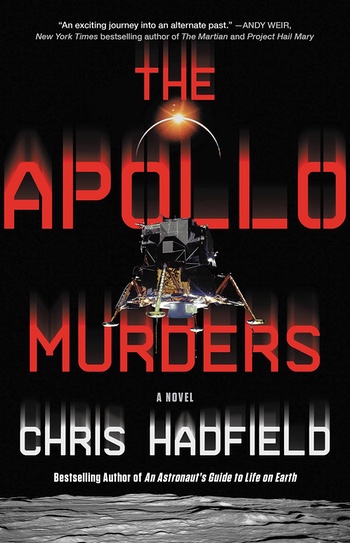Review: The Apollo Murdersby Jeff Foust
|
| Hadfield manages to find a balance between the narrative tension involved in a thriller with the technical details space enthusiasts will be looking for. |
The premise of the book is that it’s 1973, and NASA is flying one more lunar landing mission, Apollo 18, funded by the Defense Department. An all-military astronaut crew is selected to fly the mission, with support from Kaz Zemeckis, a former military astronaut candidate who was grounded after an aircraft accident cost him one eye. In the weeks leading up to the launch, though, the mission changes: in addition to going to the Moon, Apollo 18 will rendezvous with a newly launched Soviet Almaz space station the US intelligence community thinks may serve as a high-resolution spysat. Then things get really complicated and, as the title of the book suggests, people start dying. However, this is not a murder mystery as much as a technothriller, one set in the space program of a half-century ago.
Such a book could easily go disastrously bad, but Hadfield pulls it off. He manages to find a balance between the narrative tension involved in a thriller, with multiple characters and plot lines coming together for the climax, with the technical details space enthusiasts will be looking for. Hadfield offers plenty of such details, whether it’s flying a Cessna or a high-performance jet or a lunar lander. He also mixes in actual historical figures among the fictional ones, like Gene Kranz, Alan Shepard, Sam Phillips, and Vladimir Chelomei (an author’s note at the end lists those actual figures.) Hadfield pays great attention to such details and others throughout the book; it might be overlooked or simply underappreciated by some readers, who simply want to get on to the next part of the plot, but such details never really drag the pace of the action.
Of course, with any novel, there’s some leaps of logic required, like sending an Apollo mission to quickly reconnoiter—and perhaps do more to—an Almaz station before heading off to the Moon, and thinking that it could go unnoticed. There’s also the cone of silence that descends over this mission after launch, with no public reporting about the mission. Classified satellite launches are one thing, but a classified human mission to the Moon is something else; alas, there’s no reporter character trying to piece together what’s going on, or going wrong.
Setting aside those issues, The Apollo Murders is an enjoyable read, with plenty of plot twists and technical details. Hadfield had already demonstrated he could tell good stories through social media. Now he’s shown he can write good stories in fiction as well.
Note: we are using a new commenting system, which may require you to create a new account.
